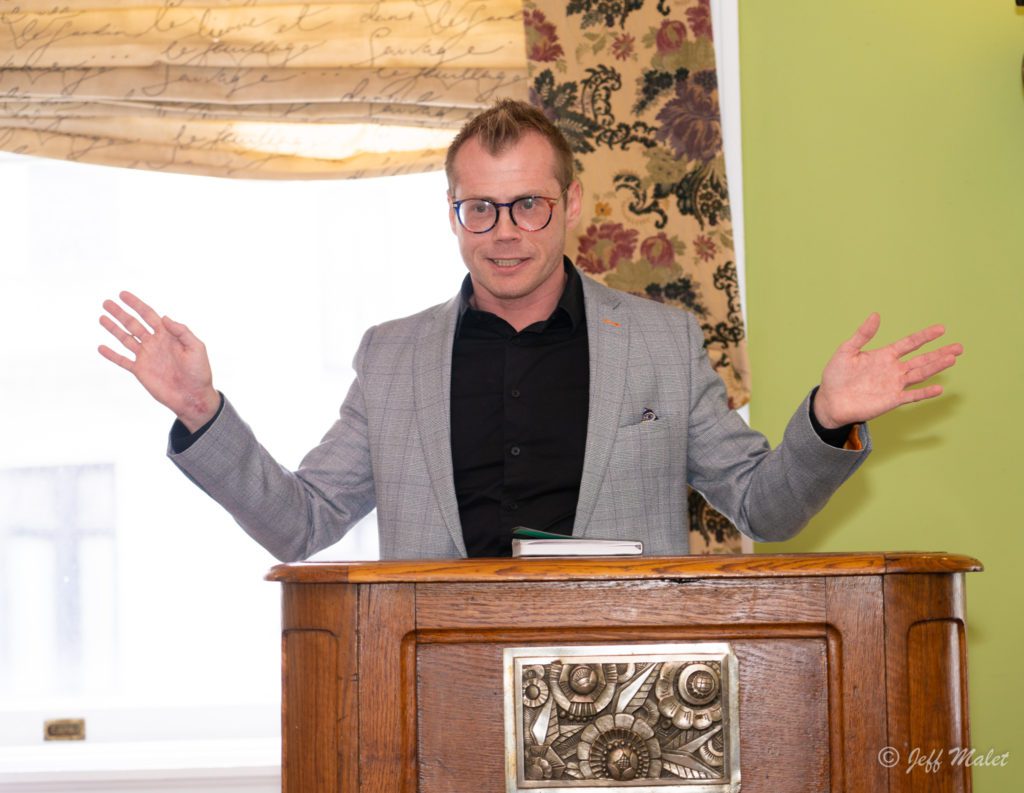Over Breakfast, Tim Nelson Talks In Series and Opera
By • April 25, 2022 0 1443

How did In Series, D.C.’s 40-year-old presenter of small-scale, opera-related productions, get its name? From all the “in” words — intimate, independent, innovative, inexpensive — used to describe it, according to Timothy Nelson, artistic director since 2018.
Nelson spoke about In Series’ past, present and future at The Georgetowner’s April 21 Cultural Leadership Breakfast at the Tabard Inn, sponsored by Long & Foster and Balfour Senior Living.
The organization’s first home was Hand Chapel at Mount Vernon College in the Foxhall neighborhood. Founder Carla Hübner, a concert pianist from Chile on the Mount Vernon faculty, was asked to organize music performances. The series soon added poetry and dance.
After George Washington University took over the college in 1999, Hübner’s In Series lost its regular venue. But she was committed to presenting zarzuelas (Spanish-language operettas) and cabaret programs for the Latin American community, along with chamber operas and performances showcasing the American Songbook.
Several years ago, the position listing for Hübner’s successor reached Nelson, who wanted to return to the U.S. after years as the artistic director of Netherlands opera companies and freelance directing in the U.K. and the rest of Europe. His record of edgy productions, while intriguing, made him too risky a hire in his home country, he said. But not for In Series.
Nelson had studied composition at Baltimore’s Peabody Conservatory — where, at age 18, he wrote and directed a 50-minute opera in a course called “Opera Études” — and directing at Indiana University. Before relocating his career to Europe, he founded and ran American Opera Theater in Baltimore, mounting everything from Baroque to contemporary opera in eye- and ear-catching ways. One of his mentors was Peter Sellars, who in the 1980s set the three Mozart–Da Ponte operas in a diner, Trump Tower and Spanish Harlem, respectively.
When he joined In Series, Hübner had already sketched out the 2018-19 season. (Example, quoting her: “Do whatever you want, but it has to be Verdi.”) He began his first season on his own in the fall of 2019 with a stripped-down “Madama Butterfly,” set in a mental institution; “Stormy Weather,” a retelling by American University’s Sybil Williams of Shakespeare’s “The Tempest,” featuring the music of Billie Holiday (and a drag queen Ariel); and an interactive presentation of the Berlioz oratorio “L’enfance du Christ” at Foundry United Methodist Church, foregrounding the Holy Family’s migrant status.
When Covid hit in March of 2020, Nelson made a drastic decision: to go all-virtual. In Series was one of the first, if not the first, company in the world to do so.
Rather than use as reserve funds the “extraordinarily generous” government and foundation support given to arts organizations during the pandemic, In Series aimed to provide its small company with “financial and creative nourishment.” Invision, “The Logan Operahouse Without Walls,” was set up online with a virtual mainstage, black box theater, education space and “embedded social space.” It hosted a phenomenal number and range of digital projects, including more than 20 films, opera “field trips” and an animated Spanish-language “La Bohème” with live music, set in Columbia Heights.
Nelson reported that the audience for In Series programming multiplied, from roughly 8,000 to possibly as many as 32,000 viewers, and that the organization received numerous contributions from first-time donors. Now that in-person performances have resumed, In Series, like other presenters, will be figuring out what “hybrid” means, he said.
In June, In Series will present “Othello/Desdemona,” a two-part show on consecutive nights. The first part is a “deconstruction/reconstruction” of Verdi’s “Othello,” an opera that is problematic because the work is “two geniuses, white men [Shakespeare and Verdi], telling what it’s like to be a Black man.” The second part is a version of Toni Morrison’s “Desdemona,” a play directed by Sellars in 2011 that, says Nelson, “should be on every shelf next to ‘Othello.’” Both parts will incorporate new visual art and music, in the case of “Desdemona,” the music of Nina Simone.
Nelson also shared that the first two shows planned for the 2022-23 season will be: a version of Monteverdi’s 17th-century opera “L’Orfeo,” with the participation of a legendary performer of Japanese Noh theater; and a performance — on three consecutive nights in three sacred spaces — of unfinished Requiems by Mozart and two other composers.
While acknowledging, in response to a question, that “we do struggle with where we fit” in Washington’s cultural scene, Nelson said, “The great thing about D.C. audiences is they’re so smart.”
The speaker at the next Cultural Leadership Breakfast, on Thursday, May 19, at the Tabard Inn, will be Melanie A. Adams, director of the Smithsonian’s Anacostia Community Museum. Tickets are $30, available for advance purchase here on Eventbrite.

